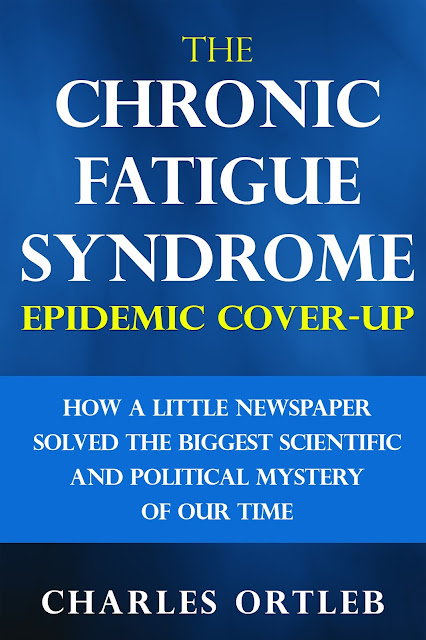NIH response to appeal for increased funding of Chronic Fatigue Syndrome research
Dear Mr. Tyler:
Thank you for your letter to National Institutes of Health (NIH) Director Dr. Francis S. Collins concerning myalgic encephalomyelitis/chronic fatigue syndrome (ME/CFS). We appreciate your kind words about his work. Dr. Collins requested that I respond to you on his behalf.
I am sorry to learn that a friend of yours has ME/CFS. Your description of her experiences underscores the devastating effects of this disease. With your letter, you included a petition that asked the NIH to increase funding for ME/CFS research to $100 million.
We at the NIH understand the necessity of improving diagnostics and finding effective therapies for ME/CFS as quickly as possible. We agree that there is a tremendous need for quality research in ME/CFS. It may be helpful for you to know that the NIH system is open for any researchers to submit their best ideas for funding excellent science in ME/CFS. The NIH grant system primarily funds work performed in individual laboratories or clinics by teams of scientists working at academic, medical, and other biomedical research institutions, including industry. Individual investigators interested in pursuing ME/CFS research can submit detailed proposals through their institutions to answer a broad range of research questions. Proposals can be submitted three times per year. Proposed projects undergo a rigorous peer review process at the NIH and are then considered for funding. Investigators receive critiques of their proposals and have the option to revise them and resubmit.
The Trans-NIH ME/CFS Working Group recognizes the acute need to cultivate more research and investigators to work on ME/CFS. In pursuit of this goal, NIH plans to bring scientists together with patients and ME/CFS advocacy groups in April 2019 to discuss the opportunities in ME/CFS research. We also plan a meeting intended to engage early-stage career scientists in ME/CFS. More information about these meetings is available at https://www.nih.gov/mecfs/events
In addition, the NIH is conducting a study on ME/CFS at the NIH Clinical Center in Bethesda, Maryland. This study, led by renowned neuroimmunologist Dr. Avindra Nath, is exploring the clinical and biological characteristics of ME/CFS following a probable infection to improve understanding of the disease’s cause and progression. Recruitment of healthy volunteers and people with ME/CFS is underway. The study is currently recruiting patients who have had ME/CFS for 5 years or fewer. You can read about the study at this website: https://mecfs.ctss.nih.gov/index.html The following site provides a contact email address and the telephone number for the NIH’s Office of Patient Recruitment: https://mecfs.ctss.nih.gov/contact.html
Please be aware that the NIH generally does not stipulate the amount of funds for specific diseases. There have been times when Congress provided funds to the NIH for specific purposes, but those instances have been rare—HIV, cancer, Alzheimer’s disease, and more recently, the crisis resulting from opioid overuse disorder. In special cases there are NIH-driven exceptions, for example, when one or more NIH Institutes set aside funds by issuing a Request for Applications (RFA). The RFAs for the ME/CFS Collaborative Research Centers (CRCs) and Data Management and Coordinating Center (DMCC) are examples.
As a result of the RFAs, in September 2017, the NIH awarded four grants to support the creation of a ME/CFS research consortium composed of three CRCs and a DMCC. These centers will help to build a strong foundation for expanding research on ME/CFS. The CRCs will each conduct independent research but will also collaborate on several projects, forming a network to help advance knowledge on ME/CFS. The data will be managed by the DMCC and will be shared among researchers within the CRCs and more broadly with the research community. You can read about the awards at https://www.nih.gov/news-events/news-releases/nih-announces-centers-myalgic-encephalomyelitis-chronic-fatigue-syndrome-research We hope that the new centers and other NIH efforts will attract researchers from other areas to propose research on ME/CFS and increase the number of young investigators entering the field.
The awards are just one result of the NIH’s efforts to advance research on ME/CFS with the goals of identifying its cause and finding biomarkers to study disease progression and monitor response to treatment. You can read about these plans in the following NIH news article from October 2015: https://www.nih.gov/news-events/news-releases/nih-takes-action-bolster-research-myalgic-encephalomyelitis/chronic-fatigue-syndrome As part of these actions, the NIH has renewed the focus and efforts of the Trans-NIH ME/CFS Working Group, which is carefully exploring the gaps in our knowledge and identifying the opportunities for research on ME/CFS. The Working Group will continue to discuss next steps to attract more researchers to this field and expand research on this disease. You may wish to visit the Trans-NIH ME/CFS Working Group website at www.nih.gov/mecfs The NIH continues to post research funding opportunities related to ME/CFS in the “Funding” section of that site. In addition, the information at the “Resources” section of the site may be helpful. If you would like to receive periodic updates about NIH activities related to ME/CFS via email, please go to that website and click on the link to “Join our listserv” at the bottom of the left sidebar. The NIH hosts regular telebriefings with the ME/CFS community to provide updates on our activities and answer questions. Announcements about upcoming telebriefings are emailed via the listserv.
In addition, the National Institute of Neurological Disorders and Stroke, which is the lead Institute for the Trans-NIH ME/CFS Working Group along with the National Institute of Allergy and Infectious Diseases, has recently formed a working group of its advisory council to provide scientific guidance on how best to advance ME/CFS research at NIH. The working group includes basic scientists, clinicians, Federal partners, advocates, and people with ME/CFS.
We hope that the steps the NIH has taken over the past 2 years and the future progress of the Centers will grow into a major scientific effort in ME/CFS research funded by grants submitted to NIH. We look forward to working with the community to gain further insights into ME/CFS that will lead to the development of effective treatments and improve the quality of life for people coping with this disease.
Sincerely,
Walter J. Koroshetz, M.D. Chair, Trans-NIH ME/CFS Research Working Group















